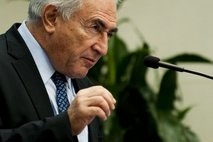G24 nations reject IMF plan on capital flows
 The finance ministers of the G24, which includes notably Brazil, India and Mexico, insisted on having the flexibility to deal with excessive capital inflows that can spur inflation and drive their currencies higher.
The finance ministers of the G24, which includes notably Brazil, India and Mexico, insisted on having the flexibility to deal with excessive capital inflows that can spur inflation and drive their currencies higher.
"Ministers did not agree with the proposed framework for staff advice to member countries on managing capital flows," they said on the sidelines of the annual spring meetings of the IMF and World Bank in Washington.
The IMF last week endorsed capital controls for the first time, but only under certain conditions and limitations, in a package of proposals for governments to manage volatile capital movements.
But the G24 ministers said the IMF needed to maintain "an open-minded and even-handed approach" to the management of capital flows.
"Policymakers of countries facing large and volatile capital flows must have the flexibility and discretion to adopt policies that they consider appropriate and effective to mitigate risks through macroeconomic policies, prudential measures and capital controls," they said in a statement.
The also said IMF policies needed to take into consideration the policies of countries where the capital originates, "especially systemically important financial centers," a veiled reference to the United States, where ultra-loose monetary policy has spurred capital flows in search of higher returns.
The IMF proposal to permit capital controls marked a milestone for the 187-nation institution, which for decades has steadfastly pushed governments to permit the free movement of capital.
The framework came in response to a call by France, which holds the presidency of the Group of 20 advanced and emerging economies this year, for capital flow guidelines.
What the stars mean:
★ Poor ★ ★ Promising ★★★ Good ★★★★ Very good ★★★★★ Exceptional
 Tag:
Tag:
Related Contents
Latest News
More News
- Russian President congratulates Vietnamese Party leader during phone talks (January 25, 2026 | 09:58)
- Worldwide congratulations underscore confidence in Vietnam’s 14th Party Congress (January 23, 2026 | 09:02)
- Political parties, organisations, int’l friends send congratulations to 14th National Party Congress (January 22, 2026 | 09:33)
- 14th National Party Congress: Japanese media highlight Vietnam’s growth targets (January 21, 2026 | 09:46)
- 14th National Party Congress: Driving force for Vietnam to continue renewal, innovation, breakthroughs (January 21, 2026 | 09:42)
- Vietnam remains spiritual support for progressive forces: Colombian party leader (January 21, 2026 | 08:00)
- Int'l media provides large coverage of 14th National Party Congress's first working day (January 20, 2026 | 09:09)
- Vietnamese firms win top honours at ASEAN Digital Awards (January 16, 2026 | 16:45)
- ASEAN Digital Ministers' Meeting opens in Hanoi (January 15, 2026 | 15:33)
- ASEAN economies move up the global chip value chain (December 09, 2025 | 13:32)






















 Mobile Version
Mobile Version